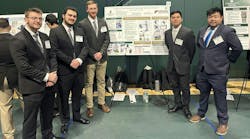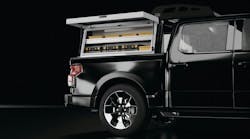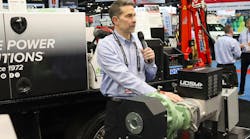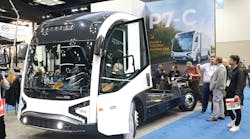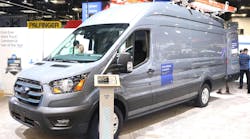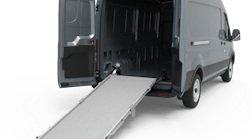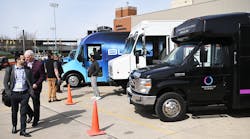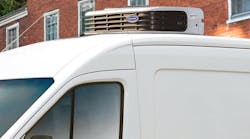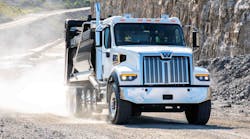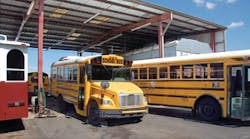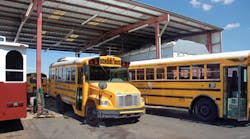School buses are nothing new at Auto Safety House, a multi-branch truck equipment distributor based in Phoenix, Arizona. But some of the things the company does with them just might be.
A full-line truck equipment distributor, Auto Safety House has been selling and servicing school buses since 1958 — just over half of the company's 99-year history. While the vast majority of those school buses have been just that, Auto Safety House has found there are plenty of uses for these vehicles and a variety of ways that they generate business.
Most recently the company partnered with Arizona's largest utility company to provide six school districts with equipment for reducing emissions from their buses. As part of the $1.25-million grant from the Salt River Project, Auto Safety House retrofitted pre-2007 model buses with new exhaust systems. In addition to the installation, the grant covers the cost of maintaining the systems through the year 2015, helping the districts transition to the Environmental Protection Agency's tighter emission standards. The grant also includes funds for educating students on environmental issues.
“The revamped buses fit in with our district's effort to be more environmentally conscious by emitting less nitrogen oxide and diesel matter”, said Tim Snow, director of transportation for Tempe Union district. “Each day, district buses travel just over 3,600 miles. The SRP grant allowed us to do something in transportation that coincided with the district's Go Green Initiative without spending extra tax dollars.”
To be eligible for the program, buses must operate on ultra-low sulfur diesel, travel at least 10,000 miles annually, have a gross vehicle weight rating of at least 19,500 pounds, and must have been built in 1994 or later.
We are pleased to be part of this project”, says Rudy Garcia, vice-president of sales and marketing for Auto Safety House. “Emissions reduction equipment funding provided by programs such as these are critical for all our school districts to help bridge budget gaps that would normally prevent them from achieving such improvements. The program also demonstrates that the districts awarded have transportation directors and administrators that are also committed to improving the environment through their participation and acceptance of the related responsibilities of this new equipment.”
In all, the program involved equipping 117 pre-2007 buses to bring them up to California Air Resources Board Level 3 requirements. In addition to the bus-mounted equipment, Auto Safety House sold the districts the equipment needed to clean the diesel particulate filters that were installed on the buses.
Custom specifications
The climate in Arizona is a lot different than it is in other parts of the country. In the southern and central portions of state, triple-digit temperatures are common, even during parts of the school year. In Phoenix, for example, temperatures reach or exceed 100 degrees on average 110 days of the year. By contrast, highs in Flagstaff average 89° and 91° in May and September, respectively, and drop from there during the school year.
To provide buses with the air-conditioning capacity that buses require, Auto Safety House provides school districts with air-conditioning systems designed to their particular needs.
“We install air-conditioning systems because we can offer our customers a greater variety of options, says Troy Naylor, director of truck operations.
But beyond that, Auto Safety House offers completely different products based on school buses. A common application is buses that have been modified to transport prisoners. For that, Auto Safety House must install steel grids over all of the windows. A recent order also included the installation of a lavatory at the back. The order included a single door that restricted access to the lavatory area as well as the rear door that leads to the outside.
Other applications have been private schools, churches, hotel and resort shuttles, youth organizations, child care centers, healthcare facilities, and retirement communities.
Generating the bus business is a team of three who represent Auto Safety House throughout the state of Arizona.
Ask the expert
Auto Safety House goes beyond selling and servicing school buses. The distributor is also a major source for learning about them.
Throughout the year, the company offers training programs on a wide range of topics. Among the topics:
Bus A/C System Maintenance and Troubleshooting; Special Needs Certification for Bus Drivers; DPS Minimum Safety Standards for Bus Drivers and Techs; Thomas Built C2 Bus Systems Maintenance for Technicians; Braun and Other Lift Maintenance and Repair for Technicians; Cargo Control CSA 2010; Bus A/C System Maintenance; School Bus Driver Pre-, During, Post Inspection; Thomas Built HDX Electrical & Chassis Troubleshooting; and School Bus Air Brake Training for Bus Drivers.
Auto Safety House typically charges tuition for each attendee. The classes are held at various Auto Safety House branches, including Phoenix, Tucson, and Holbrook, Arizona, along with the Auto Safety House branch in Las Vegas, Nevada.
Keeping them rolling
Being involved in bus sales takes Auto Safety House into areas where some truck equipment distributors do not venture. For example, the company offers:
-
Engine service. Auto Safety House routinely services Caterpillar, Cummins, and John Deere CNG engines.
-
Contract fleet maintenance programs
-
State safety inspections for school buses.
-
Annual DOT safety inspections
-
Wheelchair lift installation, maintenance and repair
-
Air conditioning installation and repairs for all manufacturers. Along with that Auto Safety House can perform axle and housing straightening and can adjust camber and caster settings.
-
Installation and repair of surveillance systems.
-
Installation and repair of exhaust treatment systems.
-
Front end alignment for medium- and heavy-duty vehicles such as highway tractors, recreational vehicles, and fire apparatus.
-
Body, collision, and paint repair.
Power from propane
Another recent initiative Auto Safety House has undertaken has been to become a certified installer for the Roush Performance Liquid Propane Injection system.
Auto Safety House became the certified Roush Performance Liquid Propane Injection (LPI) system installer for Roush Performance Vehicles.
EPA-certified Roush Performance LPI kit installations are available at each of the four Auto Safety House locations in Tucson, Holbrook, and Phoenix, Arizona and in Las Vegas, Nevada.
“Aside from the environmental benefit, prices for propane have consistently been lower than those of gasoline, primarily due to the way propane is refined,” Garcia says. “According to published government data, the price of propane per gallon, excluding taxes, averages about 78 percent of the price of gasoline. The lower cost of LP, tax benefits, and other credits available make this system a very cost effective option for all fleet operators to consider.”
Roush Performance has been working in conjunction with the Propane Education & Research Council and Ford Motor Company to develop liquid propane injection systems for a variety of Ford vehicles. These include: 2007/2008 F-150, 2009/2010 F-250/F-350, 2009 and newer E-150/E-250/E-350, and 2009 and newer E-450 cutaway vans used in shuttle bus and delivery applications.
Approaching 100 years
Auto Safety House will commemorate a century of service next year. The company was founded in 1912 as a sales and service outlet for automobiles and motorcycles.
That initial one-bay shop in Jerome, Arizona, has long since been replaced. Headquarters is now in Phoenix, 100 miles to the south, where Auto Safety House has a 60,000-sq-ft facility.
As is fitting for a company with “safety” as its middle name, Auto Safety House has been involved with products that vehicles depend on for safe operation. They include axles, brakes, suspension and steering system components, as well as products such as lights, mirrors, and electrical components. From a humble start 99 years ago, Auto Safety House now represents more than 200 different product lines and thousands of parts ready for delivery to wholesale, fleet, and retail customers.
Major truck equipment lines at Auto Safety House:
|
